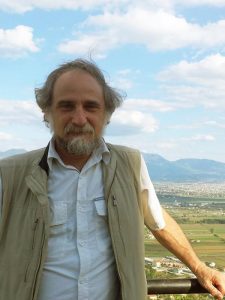The College Year in Athens (CYA) hosted a high-profile online lecture last Wednesday (March 6) revolving around the evolution of the Greek language, entitled “Continuity and Change across the History of the Greek Language”.
The guest speaker was Distinguished Prof. Brian D. Joseph, The Kenneth E. Naylor Professor of South Slavic Languages and Linguistics at Ohio State University, himself a CYA alumnus in the 1971-72 period. Dr. Mark Janse, emeritus research professor in ancient and Asia Minor Greek at Ghent University, participated in the event.
The lecture mainly focused on the grammatical element known as the “augment”, and how it was maintained and evolved over the millennia and in regional dialects.
In prefacing the lecture, Prof. Joseph noted that “a long-standing issue affecting Greece and Greeks is the question of continuity between ancient Greece and modern Greece. This is a pervasive issue with clear cultural and historical dimensions, but I argue here that there is a linguistic side to it as well, for instance with respect to which form of the modern language, καθαρεύουσα (katharevousa) or δημοτική (Dhimotiki), best shows a connection with ancient Greek.”
CYA is a non-profit educational institution serving as a cultural and educational bridge between the United States and Greece for more than half a century. Established in 1962, CYA was the first study abroad program in Greece for English-speaking undergraduates.
Brian Joseph has been at OSU since 1979, after receiving his Ph.D. from Harvard in 1978 and spending a year as a Killam Postdoctoral Fellow at the University of Alberta. His interests are quite broad, but
are focused first and foremost on the study of language change, especially in regard to the Greek language throughout all of its historical phases, from Mycenaean up through Modern Greek, including its prehistory and how it fits into the Indo-European language family and also its more recent significant contact with its neighboring languages in the Balkans.
Brian Joseph has been at OSU since 1979, after receiving his Ph.D. from Harvard in 1978 and spending a year as a Killam Postdoctoral Fellow at the University of Alberta. His interests are quite broad, but

Brian D. Joseph, University Professor of Linguistics and The Kenneth E. Naylor Professor of South Slavic Languages and Linguistics
Brian D. Joseph, University Professor of Linguistics and The Kenneth E. Naylor Professor of South Slavic Languages and Linguisticsare focused first and foremost on the study of language change, especially in regard to the Greek language throughout all of its historical phases, from Mycenaean up through Modern Greek, including its prehistory and how it fits into the Indo-European language family and also its more recent significant contact with its neighboring languages in the Balkans.
His interests run also to other languages, especially Sanskrit and Albanian, and to other areas within linguistics, including both morphological theory and the embedding of language into social structures. More recently, he has been working on issues of language sustainability, looking both at what has gone into making the Greek language relatively robust in its diasporic setting in southern Albania and at what we can determine about linguistic — and concomitantly ethnic — viability in ancient times in the eastern Mediterranean.
Prof. Joseph was elected as president of the Linguistic Society of America in 2019.
At OSU Prof. Joseph directs the Laboratory for Greek Dialectology which has various sets of materials on different Greek dialects, including both secondary sources (books and the like) and primary materials (from fieldwork and archival work) such as The Renée Kahane Collection of materials on Kephallonia (Ionian) Greek, materials on the Greek of southern Albania (based mainly on Prof. Joseph’s fieldwork).
Ohio State University also houses the Modern Greek Program, which stands as one of the strongest and most respected in the nation. The Miltiadis Marinakis Professorship for Modern Greek Language and Culture anchors the Modern Greek Program, ensuring current and future generations will have the opportunity to study and be inspired by modern Greek language and culture, in perpetuity, at one of the best universities worldwide.



